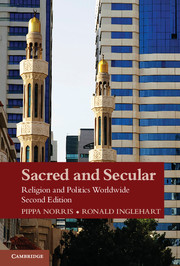Book contents
- Frontmatter
- Contents
- Tables
- Figures
- Preface and Acknowledgments
- Part I Understanding Secularization
- Part II Case Studies of Religion and Politics
- Part III The Consequences of Secularization
- Conclusions
- 10 Secularization and Its Consequences
- 11 Reexamining the Theory of Existential Security
- 12 Reexamining Evidence for the Security Thesis
- Appendix A
- Appendix B
- Appendix C
- Notes
- Bibliography
- Index
10 - Secularization and Its Consequences
from Conclusions
Published online by Cambridge University Press: 05 June 2012
- Frontmatter
- Contents
- Tables
- Figures
- Preface and Acknowledgments
- Part I Understanding Secularization
- Part II Case Studies of Religion and Politics
- Part III The Consequences of Secularization
- Conclusions
- 10 Secularization and Its Consequences
- 11 Reexamining the Theory of Existential Security
- 12 Reexamining Evidence for the Security Thesis
- Appendix A
- Appendix B
- Appendix C
- Notes
- Bibliography
- Index
Summary
since the september 2001 terrorist attacks, and their aftermath in Afghanistan and Iraq, public interest in cultural and religious differences around the world has grown tremendously, and the debate about secularization theory and its recent critiques has seemed to become increasingly relevant to contemporary concerns. The idea of secularization has a long and distinguished history in the social sciences, with many seminal thinkers arguing that religiosity was declining throughout Western societies. Yet the precise reasons for this erosion of spirituality were not entirely clear. By the mid-1960s the popular claim that religion was in a state of terminal decline rested upon flimsy evidence. Its proponents cited empirical evidence of declining churchgoing in Western Europe, and a handful of case studies that fit the thesis, rather than a systematic examination of empirical evidence from many countries.
It was not surprising, therefore, that during the last decade American sociologists mounted a sustained counterattack on the basic premises of secularization theory. This critique put many former proponents on the defensive; Peter Berger recanted former claims, noting that many exceptions had accumulated that appeared to challenge the basic prophesies of Weber and Durkheim – pointing to the continuing vitality of the Christian Right in the United States, the evangelical revival in Latin America, the new freedom of religion in post-Communist Europe, the reported resurgence of Islam in the Middle East, or evidence that religious practices and beliefs continued to thrive throughout most of Africa and Asia. Some of these reported phenomena may have been overstated, but the simplistic assumption that religion was everywhere in decline, common in earlier decades, had become implausible to even the casual observer. Too many counterexamples existed around the world. The religious market argument sought to reconstruct our thinking about the primary drivers in religious faith, turning attention away from long-term sociological trends in the mass public's demand for spiritual faith, and emphasizing instead institutional factors affecting the supply of religion, including the role of church leaders and organizations, and the role of the state in maintaining established religions or restrictions on freedom of worship for certain faiths.
- Type
- Chapter
- Information
- Sacred and SecularReligion and Politics Worldwide, pp. 215 - 242Publisher: Cambridge University PressPrint publication year: 2011

